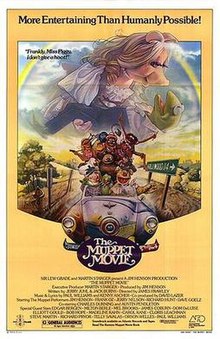
Back الدمى (فيلم) Arabic فيلم العرايس ARZ Мъпет Кино Bulgarian The Muppet Movie CEB فیلمی ماپێتس CKB The Muppet Movie CY Muppet Movie German The Muppet Movie Spanish فیلم ماپتها FA Muppet-elokuva Finnish
| The Muppet Movie | |
|---|---|
 Theatrical release poster by Drew Struzan | |
| Directed by | James Frawley |
| Written by | |
| Produced by | Jim Henson |
| Starring | |
| Cinematography | Isidore Mankofsky |
| Edited by | Christopher Greenbury |
| Music by | |
Production companies | |
| Distributed by | Associated Film Distribution[a] |
Release dates |
|
Running time | |
| Countries |
|
| Language | English |
| Budget | $8 million[6] |
| Box office | $65.2 million[7] |
The Muppet Movie is a 1979 musical road comedy film directed by James Frawley and produced by Jim Henson, and the first theatrical film to feature the Muppets. A co-production between the United Kingdom and the United States, the film was written by The Muppet Show writers Jerry Juhl and Jack Burns. Produced during the third season of The Muppet Show, the film tells the origin story of the Muppets, as Kermit the Frog embarks on a cross-country trip to Los Angeles, encountering several of the Muppets—who all share the same ambition of finding success in professional show business—along the way while being pursued by Doc Hopper, a greedy restaurateur with intentions of employing Kermit as a spokesperson for his frog legs business.
The film stars Muppet performers Henson, Frank Oz, Jerry Nelson, Richard Hunt, and Dave Goelz, as well as Charles Durning and Austin Pendleton, and it features cameo appearances by Bob Hope, Dom DeLuise, James Coburn, Cloris Leachman, Richard Pryor, Telly Savalas, Edgar Bergen (in his final film appearance before his death), Orson Welles, Carol Kane, Steve Martin, and Mel Brooks, among others. Notable for its surreal humour, meta-references and prolific use of cameos, The Muppet Movie was released by Associated Film Distribution in the United Kingdom on May 31, 1979, and in the United States on June 22, 1979.
The film received critical praise, including two Academy Award nominations for Paul Williams and Kenneth Ascher's musical score and their song, "Rainbow Connection". The Muppet Movie was followed by seven feature films starring the Muppets, as well as several more television series and media. In 2009, the film was deemed "culturally, historically, or aesthetically significant" by the Library of Congress and selected for preservation in the National Film Registry.
- ^ Jay Jones 2013, p. 374–375.
- ^ Thompson, Simon (July 25, 2019). "Remembering 'The Muppet Movie' At 40 With Gonzo". Forbes. Retrieved July 25, 2019.
- ^ "Make the Rainbow Connection Again as 'The Muppet Movie' Returns to the Big Screen in Honor of its 40th Anniversary on July 25 and 30". prnewswire. Fathom Events. June 3, 2019. Retrieved May 15, 2020.
- ^ "The Muppet Movie (U)". British Board of Film Classification. May 14, 1979. Archived from the original on September 9, 2015. Retrieved July 27, 2015.
- ^ "Box Office Information for The Muppet Movie". The Numbers. Retrieved January 23, 2016.
- ^ Jay Jones 2013, p. 296.
- ^ "The Muppet Movie". Box Office Mojo. Retrieved March 31, 2021.
Cite error: There are <ref group=lower-alpha> tags or {{efn}} templates on this page, but the references will not show without a {{reflist|group=lower-alpha}} template or {{notelist}} template (see the help page).